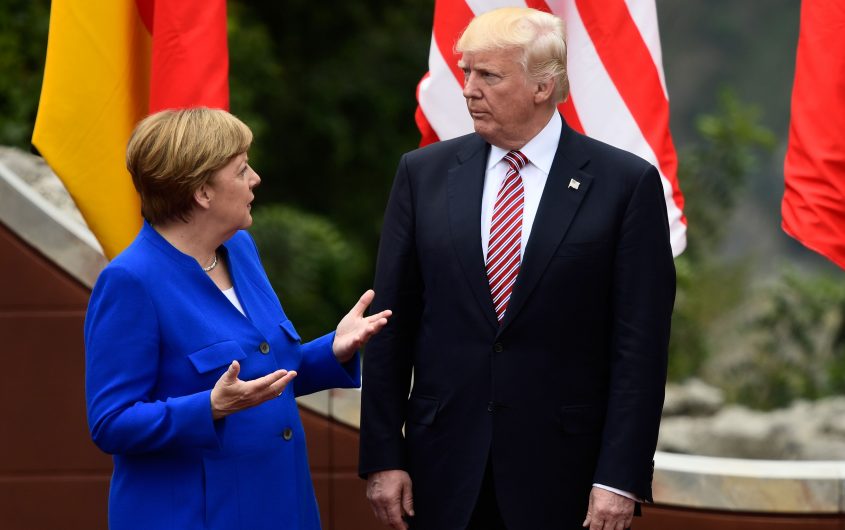
MIGUEL MEDINA/AFP/Getty Images
Fragile Friendships and Polarized Politics: Foreign Policy in 2018

Jackson Janes
President Emeritus of AGI
Jackson Janes is the President Emeritus of the American-German Institute at the Johns Hopkins University in Washington, DC, where he has been affiliated since 1989.
Dr. Janes has been engaged in German-American affairs in numerous capacities over many years. He has studied and taught in German universities in Freiburg, Giessen and Tübingen. He was the Director of the German-American Institute in Tübingen (1977-1980) and then directed the European office of The German Marshall Fund of the United States in Bonn (1980-1985). Before joining AICGS, he served as Director of Program Development at the University Center for International Studies at the University of Pittsburgh (1986-1988). He was also Chair of the German Speaking Areas in Europe Program at the Foreign Service Institute in Washington, DC, from 1999-2000 and is Honorary President of the International Association for the Study of German Politics .
Dr. Janes is a member of the Council on Foreign Relations, the International Institute for Strategic Studies, the Atlantic Council of the United States, and American Purpose. He serves on the advisory boards of the Berlin office of the American Jewish Committee, and the Beirat der Zeitschrift für Außen- und Sicherheitspolitik (ZfAS). He serves on the Selection Committee for the Bundeskanzler Fellowships for the Alexander von Humboldt Foundation.
Dr. Janes has lectured throughout Europe and the United States and has published extensively on issues dealing with Germany, German-American relations, and transatlantic affairs. In addition to regular commentary given to European and American news radio, he has appeared on CBS, CNN, C-SPAN, PBS, CBC, and is a frequent commentator on German television. Dr. Janes is listed in Who’s Who in America and Who’s Who in Education.
In 2005, Dr. Janes was awarded the Officer’s Cross of the Order of Merit of the Federal Republic of Germany, Germany’s highest civilian award.
Education:
Ph.D., International Relations, Claremont Graduate School, Claremont, California
M.A., Divinity School, University of Chicago
B.A., Sociology, Colgate University
Expertise:
Transatlantic relations, German-American relations, domestic German politics, German-EU relations, transatlantic affairs.
__
If 2017 felt like a roller coaster ride, then tighten your seatbelt for 2018. The challenges confronting the German-American partners are only going to accelerate and the choices are only going to grow more complex. In both Germany and the U.S., the domestic arena will be filled with conflict and controversy, all within a global environment of threats and vulnerabilities. We all need to get ready for what could be a bumpy ride.
It was a year of domestic political earthquakes for Germans and Americans in 2017. From “American carnage” and “America First” to “Fake News” and repeated refrains of “Make America Great Again,” President Trump has brought new rhetoric—and new tools of communication—to the White House. Although much of this rhetoric did not match reality, the Trump administration has been successful at reframing the debate on volatile issues such as immigration, environmental and energy policies, and health care. It has been focused on reducing the size of government, rolling back federal regulation, and rewriting tax policy. With the unique advantage of having the Senate, the House, and the White House under Republican control, the president is attempting to use that leverage to fundamentally remake American domestic policies. Or, as he would tweet, #MAGA.
That Trump and the Republicans have not been as successful as expected in his first year in office should come as no comfort for 2018. The same volatility we saw in 2017—within the Republican Party, in Congress, from the president himself—will be present in the year ahead. That Trump can claim only one legislative victory—tax reform—is evidence of the president’s own eclectic and erratic style, one which has generated a significant backlash among his critics and members of the media, the judicial system, and Congress.
Looking to 2018—a midterm election year—we’ll see a referendum on Trump’s presidency. Republicans and Democrats are gearing up for an intense battle for control of Congress, one that will be fought in a way that virtually every legislative issue, each nomination to office or challenge to the president, is viewed as a test of strength. Battles over spending, cuts in social programs, ballooning deficits, and health care will drive the domestic clashes. Immigration policy will remain in the foreground, as will questions about the reach and responsibility of government.
In short, 2018 will be just as ugly and divisive as 2017. And these domestic battles will continue to hinder U.S. responses to foreign policy challenges and crises.
Germany’s earthquake was just as serious—but different. While Angela Merkel survived a fourth run as candidate for chancellor, she must now deal with a far-right party (the Alternative for Germany, AfD) in the Bundestag. Election results and the subsequent coalition negotiations have left her unable to forge a government. It is a task that will likely continue well into the first quarter of 2018—perhaps even further if new elections are called—and the prospects for a coalition government remain uncertain. The Social Democrats and the CDU/CSU remain at odds on many issues similar to those in the U.S.: taxation, immigration, social spending, and infrastructure investment. Whether they can find sufficient common ground remains to be seen. Should a coalition be elusive, the options available to Merkel are unprecedented in modern Germany. The default move would be a minority government led by Angela Merkel, who would be forced to build a majority for each piece of proposed legislation. How long that would last is anyone’s guess. The other option—new elections—is even less popular.
A majority of Germans are in favor of a third grand coalition between the CDU/CSU and the SPD. While Angela Merkel would lead that coalition, differences on domestic issues will make it difficult to hold it together. In the end, the predictability of a German government—a long-standing trademark of postwar Germany—will be weakened.
And so Germany enters 2018 in a state of disarray, forced to deal as much with internal politics as with actual foreign or domestic policymaking.
The curious backdrop to these political struggles is the relatively vibrant economic situation on both sides of the Atlantic. Germany is seeing strong growth, record-breaking exports, low unemployment, and marginal inflation. The U.S. is also experiencing strong growth rates with a dynamic stock market and now a new tax regime designed to attract more capital investment.
Despite this, there is a good deal of anxiety about present economic trends and their sustainability on both sides of the Atlantic, between memories of the global recession a few years ago and the ongoing populist blowback to that disaster.
The combination of unregulated globalization, growing inequality, declining social mobility, and increased social and cultural divisions is being accompanied by the declining ability of traditional political parties and elites to respond to grievances and demands. This is reflected in the rise of the AfD in Germany, and in Donald Trump’s victory in the U.S.
Meanwhile, the global environment is also marked by unpredictability and uncertainty. The Secretary General of the United Nations issued what he called a “red alert,” warning of the increased dangers facing the world in 2018: “Global anxieties over nuclear weapons are the highest since the Cold War, and climate change is moving faster than we are. Inequalities are growing, and we see horrific violations of human rights. Nationalism and xenophobia are on the rise.”
The potential for regional conflicts to metastasize into global catastrophe is illustrated by the tensions over North Korean nuclear ambitions. The clashes between Saudi Arabia and Iran are increasing the chances for another regional war in the Middle East. Russia continues to send threatening signals to European countries, while engaging in destabilizing Ukraine and securing its presence in Syria. China is expanding its economic reach throughout the world—including in Germany—as well as building up its military capacity with its first off-shore military base in Djibouti. Millions of refugees, seeking safe harbors around the world, will continue to challenge Europe and the United States and their ability to respond. And amid these problems, the European Union is coping with its own ability to sustain its coherence in the wake of Brexit. Meanwhile the U.S. struggles with a fierce debate about its role on the world stage.
Achieving domestic consensus in Germany and the U.S. is an increasingly difficult task—let alone achieving consensus in the foreign policy arena.
How will all this impact German-American relations? On the one hand, there is a vast network of connections between the two countries much larger than the political equations between the current governments.
Germany and the U.S. need to collaborate on issues that are anchored in the national interests of both countries and in shared goals at multiple levels. That is what has been at the core of the relationship for decades. That has been part of the enormous business network wrapped around it, the web of research and educational relations permeating it, the exchanges of experiences and innovation at state and local levels, the interaction of military forces. All of this makes up the broad composite picture of multifaceted dialogues between the two nations.
The agendas of that strategic dialogue include the interdependence of our national security, the shared concerns about our economic well-being, the sustainability of an open and conflict-free global network of trade relations, the adherence to a basis of law and justice, and a belief in shared burdens as well as opportunities. That includes understanding a set of challenges that deal with our societal cornerstones such as the future of work, social communication, energy, environmental health, and demographic transformations.
On the other hand, the debates within each country have the potential to drive a bigger wedge between them. Clashes over government policies are nothing new in German-American relations. But the mix of style and substance emanating from President Trump has alienated a large portion of the German public, and has become part of their domestic debate about foreign policy issues such as defense postures, relations with Russia, climate change, or trade policies.
German politics is far less present in American domestic debates, but certain issues such as defense spending, Iran, or EU policies draw in German perspectives and positions—for better or for worse.
Even if there is a comprehensive agreement on strategy in dealing with most challenges, Germany and the U.S. will often differ on tactics. But dealing with those differences will be that much more difficult if the consensus on strategy is no longer shared.
That is a danger in 2018. We have heard echoes of that in statements coming out of Berlin and Washington questioning whether the mix of priorities, interdependence, and reliability still define the German-American relationship.
The increasing amount of centrifugal forces pulling at the fabric of our respective domestic arguments over priorities, expectations, and responsibilities is making national debates increasingly parochial. We are fragmented by the deepening divisions within our political and cultural parameters. That makes it that much more difficult to hear and understand the debates beyond our borders. The trials and tribulations elsewhere become fodder for our own disagreements. And the result is a contagious spread of zero sum encounters. We find it difficult to define what we need from each other and why we need it.
2018 will be a pivotal year—one in which Germans and Americans will need to test the relationship and its ability to deal with dialogue over differences. It is a test both countries face in their domestic frameworks as well. Both will impact on each other—for better or for worse.








